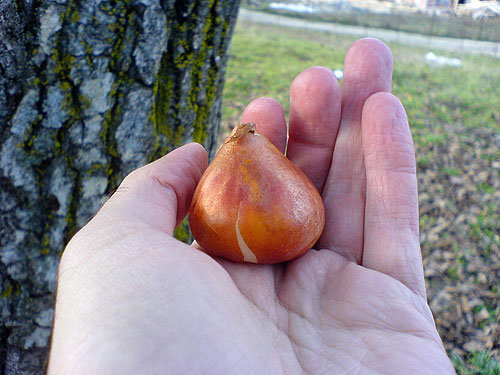One Man’s Tulip, Another Man’s Onion December 10, 2010
Author: Beach Combing | in : Modern , trackbackTulip production was, in early Modern Europe, a challenging affair. For one the tulip itself was not an indigenous plant. It had come, with so many other items – including curiously goods from the New World – through the Ottoman Empire.
Next, growing a tulip from seed takes from six to twelve years. These were not black orchids but still… They demanded a lot of care and fancy green fingering to arrive at maturity. Beachcombing thinks of the prices for a bonsai tree today.
Exotic, difficult to grow and yet strangely beautiful to sixteenth- and seventeenth-century Europeans, who had never seen anything like them, tulips were bound to be popular especially among the new mercantile classes looking for novel forms of sumptuary folly. And, in fact, the continent went tulip mad. In Scotland in the late seventeenth century, for example, a tulip could set you back ten guineas, while as late as 1835 we have a record from England of a tulip bulb being sold for 75 pounds!
These were house buying prices.
But this is as nothing compared to the prices reached in Holland in 1636. Beachcombing is not going to get into the details of the notorious tulip craze of that year. But sufficient to say that from November to February the price of tulips rose to twenty times its starting value before crashing, in February, back to earth.
Beachcombing will leave it to economists to argue about whether this was a really a ‘bubble’ or a bout of commercial madness in a boring season – views vary and we have too little evidence to really get to grips what was going on.
However, he will recount a classic and enjoyable tale from the Madness of Crowds by the celebrated bizarrist Charles Mackay (obit 1889).
People who had been absent from Holland, and whose chance it was to return when this folly was at its maximum, were sometimes led into awkward dilemmas by their ignorance. There is an amusing instance of the kind related in Blainville’s Travels. A wealthy merchant, who prided himself not a little on his rare tulips, received upon one occasion a very valuable consignment of merchandise from the Levant. Intelligence of its arrival was brought him by a sailor, who presented himself for that purpose at the counting-house, among bales of goods of every description. The merchant, to reward him for his news, munificently made him a present of a fine red herring for his breakfast.
The sailor had, it appears, a great partiality for onions, and seeing a bulb very like an onion lying upon the counter of this liberal trader, and thinking it, no doubt, very much out of its place among silks and velvets, he slyly seized an opportunity and slipped it into his pocket, as a relish for his herring. He got clear off with his prize, and proceeded to the quay to eat his breakfast. Hardly was his back turned when the merchant missed his valuable Semper Augustus, worth three thousand florins or about 280 pounds sterling. The whole establishment was instantly in an uproar; search was everywhere made for the precious root, but it was not to be found. Great was the merchant’s distress of mind. The search was renewed, but again without success. At last someone thought of the sailor.
The unhappy merchant sprang into the street at the bare suggestion. His alarmed household followed him. The sailor, simple soul! had not thought of concealment. He was found quietly sitting on a coil of ropes, masticating the last morsel of his ‘onion’. Little did he dream that he had been eating a breakfast whose cost might have regaled a whole ship’s crew for a twelve-month; or, as the plundered merchant himself expressed it, ‘might have sumptuously feasted the Prince of Orange and the whole court of the Stadtholder’. Anthony caused pearls to be dissolved in wine to drink the health of Cleopatra; Sir Richard Whittington was as foolishly magnificent in an entertainment to King Henry V; and Sir Thomas Gresham drank a diamond, dissolved in wine, to the health of Queen Elizabeth, when she opened the Royal Exchange: but the breakfast of this roguish Dutchman was as splendid as either. He had an advantage, too, over his wasteful predecessors: their gems did not improve the taste or the wholesomeness of their wine, while his tulip was quite delicious with his red herring. The most unfortunate part of the business for him was, that he remained in prison for some months, on a charge of felony, preferred against him by the merchant.
Several of Mackay’s sources for his study of ‘tulipomania’ were ‘late medieval’ in tone with a dislike of usury and other imagined sins of the merchant. It is easy to imagine his anecdotes being conjured out of the air then by bitter, flagellating sorts in the seventeenth century.
His source here, however, was quite different: De Blainville’s Travels through Holland, Germany, Switzerland but especially Italy: by the late Monsieur de Blainville in three volumes. Translated from the author’s manuscript, never before published (1757). There is a chance then that the tulip-eating incident really happened.
With apologies to the naval officer, Beachcombing hopes that it did.
Ostrich has recently helped Beachcombing with homo sapiens eating absurdly expensive things. Any other suggestions? drbeachcombing AT yahoo DOT com



